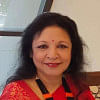Afia Dil of San Diego

Association with Professor Afia Dil dates back to August of 1947, when Abbasuddin Ahmed had migrated to erstwhile East Pakistan. He had rented the home of Afia's mom, Safura Begum, a pioneer of women's education herself. Safura Begum was a primary school teacher in Jinjira, Dhaka. Her husband encouraged her to be so, and at a very early age Afia learned her alphabets while hanging around her Mom. It is through the mentorship of another unique lady, the principal of her school Ms. Ellet Alfanso, that Afia understood her pursuit in life was different from others and that she was fortunate enough to get this education. She took English literature as her subject in University of Dhaka, earning both BA and MA in the same. During those times after 1947, Afia was present in the meeting where Muhammad Ali Jinnah declared "Urdu and only Urdu was going to be the national language of Pakistan".
She was the Professor and Chairperson of English at the Eden Girls' College (1954-1961), where she was a role model to many women. She left Bangladesh with two small daughters and studied for masters in English and Applied Linguistics from the University of Michigan and PhD in linguistics from Stanford University. I remember her cool smirk as she narrated to me how she met Dr. Anwar Dil in California and got married to him. She taught in various colleges and universities in the US, she was the Professor Emeritus at the International University, San Diego, California.
Apart from several books and research papers in Bengali and English, she has translated Taranga Bhanga, published from Bangla Academy as The Breakers. With Anwar Dil she has co-authored a 740 page book (published by Adorn publications) titled Bengali Language Movement to Bangladesh (2000), which hailed as the most judicious research work on the creation of Bangladesh as a nation-state. Her write ups include Letters from New Zealand, The country that I remember, a translation of I learn from children (1955, originally by Caroline Platt) and a translation of Hellen Keller's My teacher.
In Karimganj, Dhaka she and her brother Professor Emeritus Aminul Islam established a school in her mother's name. More than 500 female students study there and the thirst for knowledge has been propagated from her three children, students in the US, colleagues to numerous young women in her village who are benefitted by this possibility.
My program in San Diego was memorable as Dr. Dil agreed to say a few words and after the program I went to the graveyard of Dr. Afia Dil. Tears rolled from eyes, even though she had led a very full life, the thirst remains, some of which is left for us to fulfill by following her footsteps.
Nashid Kamal is an academic, Nazrul exponent and translator.

 For all latest news, follow The Daily Star's Google News channel.
For all latest news, follow The Daily Star's Google News channel. 



Comments